Aliyanna Overcomes the Odds, Celebrates Her Second Birthday with Her Care Team
12.16.2019 | Seattle Children's Press Team
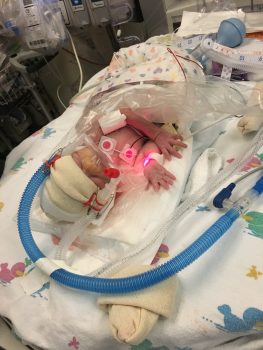 From the first time Daisy Martinez heard the thumping of her baby’s heartbeat, she was in love. She always wanted to be a mother and hoped for a baby girl. She even had a name picked out: Aliyanna.
From the first time Daisy Martinez heard the thumping of her baby’s heartbeat, she was in love. She always wanted to be a mother and hoped for a baby girl. She even had a name picked out: Aliyanna.
When doctors confirmed Martinez was having a baby girl, she was elated. Unfortunately, her joy was short-lived. During an ultrasound 25 weeks into her pregnancy, the ultrasound technician noticed something amiss. A large lump was growing on Aliyanna’s spine.
Initially, doctors in her hometown in Oregon, believed the lump was spina bifida, but after Martinez was referred to a hospital in Portland, doctors confirmed the unimaginable: the growth was cancerous.
“I was devastated and heartbroken,” Martinez said. “I felt like I had done something wrong.”
The day after Christmas, Martinez was admitted to the hospital because she couldn’t feel Aliyanna moving. On Dec. 28, 2017, Aliyanna stopped breathing. Martinez was rushed into the operating room for an emergency cesarean section. Before she could see or hold her little girl, Aliyanna was taken immediately to the neonatal intensive care unit (NICU).
“I didn’t know if she was going to make it,” Martinez said. “I was so scared.”
But as Aliyanna was whisked away, Martinez heard the distinctive cry of her newborn baby girl. Relief flooded over her.
“She was alive,” she said.
Against the odds
Born at only 30 weeks, Aliyanna weighed less than four pounds. The odds seemed stacked against her. The large tumor on Aliyanna’s spine was further complicating the fragile newborn’s health.
Hours after Martinez gave birth, doctors allowed her to see Aliyanna for the first time.
“She looked so helpless,” Martinez said.
Through the clear plastic of the incubator in the NICU, Martinez reassured her tiny baby. She couldn’t hold her or touch her, but she let her know she was there. Every day, Martinez was by her side.
Saying goodbye
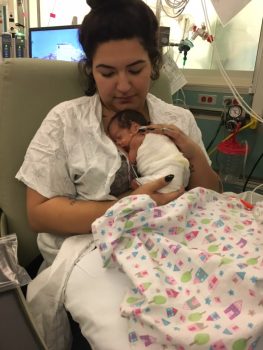 Three days after Aliyanna was born, the large tumor on her back ruptured. There was nothing Martinez could do but watch as doctors and nurses rushed to Aliyanna’s aid, a cacophony of beeps blaring all around them.
Three days after Aliyanna was born, the large tumor on her back ruptured. There was nothing Martinez could do but watch as doctors and nurses rushed to Aliyanna’s aid, a cacophony of beeps blaring all around them.
Paralyzing fear gripped Martinez. A nurse told her to say goodbye to her newborn daughter.
“They told me there was nothing they could do,” Martinez said. “They wanted me to hold her as she passed away.”
Martinez put her hands on her tiny daughter for the first time.
“I told her that she was strong,” Martinez said. “Her little head was in my hands and I rubbed it. I told her it was okay to go. No mother should ever have to say goodbye to their baby.”
Suddenly, the bleeding stopped. Aliyanna was a fighter. She wasn’t ready to say goodbye.
The next morning, Aliyanna was taken into surgery. Martinez prayed that wasn’t the last time she’d ever get to see her baby girl.
And to her enormous relief, it wasn’t.
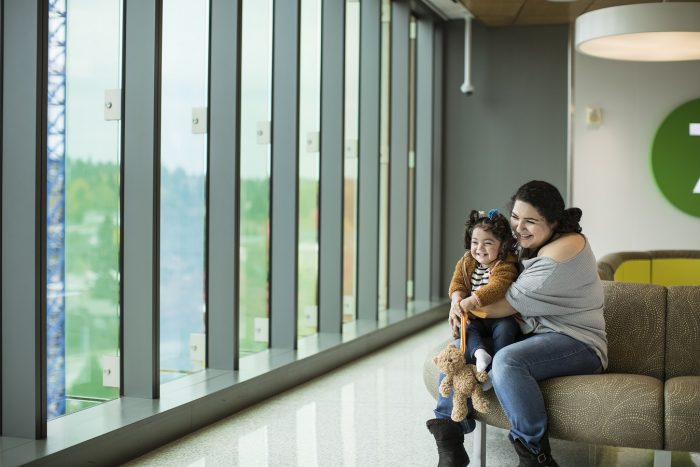
As Martinez now holds her squirmy toddler, it’s hard for her to think back to that terrifying day. Nearly two years ago, Martinez was saying goodbye. Today, she is singing happy birthday to her daughter, watching as her spunky and fiercely independent little girl reaches for two small candles on a birthday cake.
Aliyanna has come such a long way since that day, but her journey hasn’t been an easy one.
“There was a time I didn’t know if I’d leave the hospital with a baby,” Martinez said. “I can’t imagine life without her.”
Aliyanna is alive today thanks to what Martinez calls ‘a miracle.’
A lifesaving option
Those 12 hours waiting for news from the operating room were the longest of Martinez’s life. Aliyanna survived the surgery, but the cancer was insidious. By February, the tumor on her back had regrown.
Martinez was given the option of chemotherapy to try to shrink the growing mass, but that option seemed too grave. Aliyanna was so small, and the thought of her tiny newborn going through such a toxic treatment broke her heart.
That’s when her doctors in Portland provided her with a second option. Seattle Children’s was in the early phase of a clinical trial for an experimental drug called larotrectinib, a more precise and less toxic alternative to chemotherapy. It seemed like a gamble at the time, but Martinez took a leap of faith.
“When you hear the word trial, you know it’s not guaranteed to work,” Martinez said. “I was nervous, but I decided to give it a try.”
Aliyanna was flown from Portland to Seattle Children’s, where they met with Dr. Doug Hawkins, division chief of Hematology and Oncology.
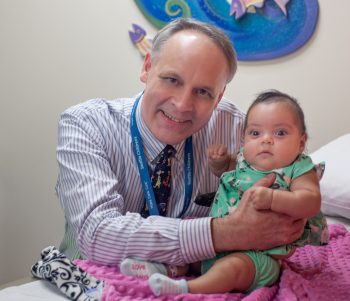 Larotrectinib targets a specific gene alteration associated with soft tumors like Aliyanna’s. A paper published in The New England Journal of Medicine, and co-authored by Hawkins, showed promising results. Overall, 75% of patients responded to the treatment and at one year, 71% experienced no disease progression.
Larotrectinib targets a specific gene alteration associated with soft tumors like Aliyanna’s. A paper published in The New England Journal of Medicine, and co-authored by Hawkins, showed promising results. Overall, 75% of patients responded to the treatment and at one year, 71% experienced no disease progression.
Martinez hoped she was making the right decision for her daughter. She put her trust in the care team at Seattle Children’s.
At only 7 weeks old, Aliyanna was the smallest baby enrolled in the trial, weighing just under 6 pounds.
Quickly, Seattle Children’s became like a second home, and Aliyanna’s care team became like a second family. Within just a few weeks of starting larotrectinib, Aliyanna’s tumor shrunk significantly.
“At the time, larotrectinib was investigational, which means it was not available except as a clinical trial,” Hawkins said. “It was developed to specifically inhibit a protein that is altered in infantile fibrosarcoma, the type of cancer Aliyanna had. It’s a type of precise therapy that goes after the root cause of cancer.”
Hawkins says the drug acts like a car’s brake. The specific gene alteration causes the protein to constantly be turned on. Larotrectinib turns that accelerator off.
“It felt like a miracle,” said Martinez.
At 3 months old, Martinez finally got to hold her baby freely, because Aliyanna’s back had healed enough for her to be lifted. Martinez was overwhelmed with hope.
“You could see that she had more life in her,” said Martinez. “That was the moment when I started to believe she’d go home.”
The drug gave Aliyanna a second chance.
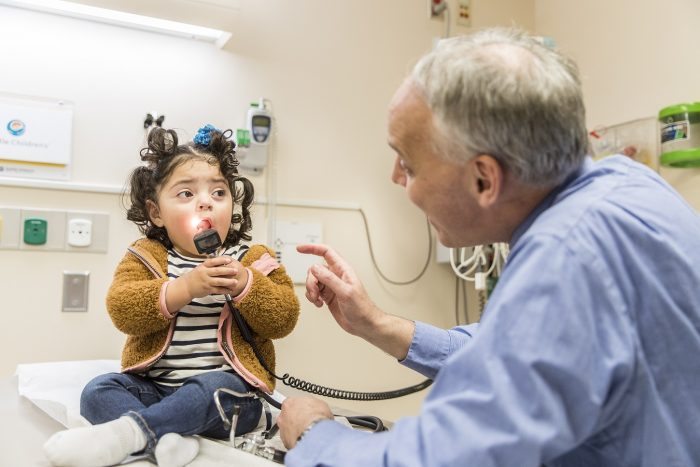
A bright future
Aliyanna and her family were finally able to go back to their home in Prineville, Oregon.
Today, Aliyanna has been on the medication for almost two years.
“Aliyanna is doing wonderfully,” Hawkins said. “There is no sign her cancer is coming back.”
Her family travels to Seattle Children’s nearly every month for appointments, but it’s a drive they don’t mind making.
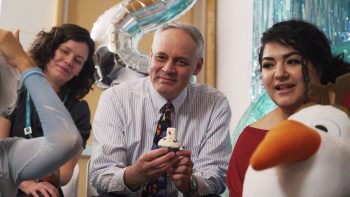 “It’s good seeing our care team every month,” said Martinez. “They make Aliyanna feel loved and welcome. They’re like another family for us. They’ve seen her grow up.”
“It’s good seeing our care team every month,” said Martinez. “They make Aliyanna feel loved and welcome. They’re like another family for us. They’ve seen her grow up.”
During their latest visit, her care team had a special surprise planned. On Dec. 28, Aliyanna will turn 2 years old, and so her care team decided to celebrate the monumental milestone in a special way: with a winter wonderland birthday party.
Her doctors and nurses celebrated their tiny little fighter who has grown to be a smiley 2-year-old.
A special visitor even came to celebrate all the way from her frozen kingdom. The visit was magical.
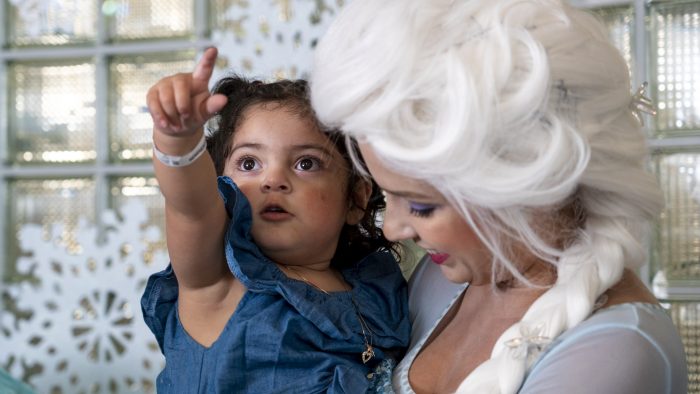
“I’m very proud of my daughter,” Martinez said. “Aliyanna could’ve given up at any point in her life. But she chose to continue to fight, to be strong,” Martinez said.
Hawkins hopes one day Seattle Children’s will be able to offer every child with cancer the same miraculous outcome.
“It’s possible that larotrectnib will be viewed as a paradigm shift,” Hawkins said. “To see a drug that has very few side effects but has incredible effectiveness is remarkable.”
He says he’s hopeful for that future.
In 2018, the U.S. Food and Drug Administration (FDA) approved the cancer drug Vitrakvi, previously known as larotrectinib. Hawkins says the next step is to make the medication available as an initial treatment option, so more children like Aliyanna can benefit from this type of therapy.
“We simply couldn’t do cancer clinical trials without the support of philanthropy,” Hawkins said. “We know that pediatric cancer receives only about 3% of the budget supporting cancer research from the National Cancer Institute. We think the lives of children are incredibly valuable and we should invest more money in that, but the reality is the money available from federal grants to support pediatric cancer research is limited. If we want to be able to offer cancer trials to all children who have cancer, we need to have the support of our community through philanthropy.”
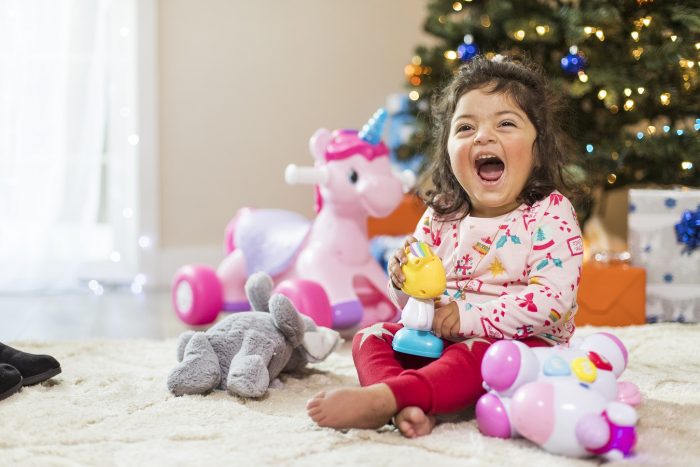
Aliyanna beat the odds. Together, we can change them. Through breakthrough research, compassionate care, and support from generous people like you, Seattle Children’s can envision a day when we can say yes to hope, care and cure for every child. Give now.
Learn more about Aliyanna’s incredible story, research and clinical trials.